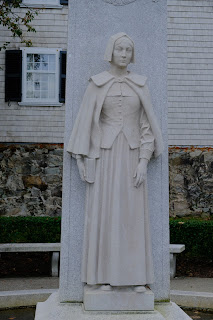BEHELD (2021)
By TaraShea Nesbit
Penguin, 266 pages.
★★★★
If you need a reminder that historical figures seldom wear halos, Beheld will rattle you back on track. This slim volume by TaraShea Nesbit is fictional, but rings true.
Since 1971, when historian John Demos tried to rescue the Pilgrims and Puritans a bit from the perception that they were bigoted, other scholars have demonstrated that Plymouth Colony or the Massachusetts Bay settlements were commonwealths in name only. The latter is certainly Nesbit's view. Her tale begins in The Netherlands, where William Bradford's followers had fled after leaving the Church of England.* The beautiful Dorothy, who is in an arranged marriage to the Rev. Bradford, and plain-faced Alice are best friends. Against her wishes, Dorothy boarded The Mayflower to help build a Separatist colony in North America. Dorothy drowns when the ship made landfall in today's Provincetown and the question is whether it was a suicide or a homicide. Three years later, Bradford sends for Alice to be his new wife, also against her desire.
In 1620, The Mayflower sailed on to a spot dubbed Plymouth for the English port from which boats left the Old World for the New. At some point during the journey, the Rev. Bradford is said to have penned “The Mayflower Compact,” a treatise on how settlers were to live together in their new home. Whether he read this document to those aboard The Mayflower is shrouded in myth. (If you care, there's no truth whatsoever to Plymouth Rock as the final landfall site. The legend of Plymouth Rock emerged 121 years after the fact.) What we do know is that the persecuted Pilgrims turned the tables on anyone who didn't share their views: non-church members, newer arrivals, indentured servants, and Wampanoag natives. (You can add the First Thanksgiving to a list of events that are more legend than fact.) Today there's a statue in Plymouth to intrepid Pilgrim women, but Nesbit's Alice Bradford might have laughed at it.
Nesbit tells her tale through alternating viewpoints from Dorothy, Alice, John Billington, his wife Eleanor, and John Newcomen, the last who became the Colony's first murder victim. The Billingtons wanted more and appropriated fields that had been promised to and cleared by Newcomen. That really happened. Billington took advantage of shifting political alliances, toadied up to Myles Standish, and literally got away with murder. Nesbit alternates points of view, but hers is mainly a story about women told in their voices. Very little is flattering to the Pilgrims. Plymouth is a place where a 13-year-old girl is raped, self-righteousness reigns, and women are pawns in games devised by men. The crucial question is how women negotiated their status. Eleanor does so by hitching her fate to that of her ambitious husband; Alice through bursts of defiance and outspokenness. Nesbit speculates about Alice's character but it certainly couldn't have been easy being a stepmother to Dorothy's two sons or the wife of a stern minister.
I reiterate that this is a novel, not the work of a professional historian, but Nesbit's extrapolations fit within a society marked by vengefulness, discontent, and hypocrisy. As we observe with distressing regularity today, much can be justified by those who are convinced they are doing God's will. Nesbit writes in concise language and constructs a plausible emotional world for women in a new land that nonetheless governed through old-style patriarchy. Nor was Nesbit fanciful in imagining a precarious world in which casual cruelty was an element of life itself. Plymouth Colony was certainly a better place to be than Jamestown, which was far more violent and starvation ran rampant. Still, Plymouth was no utopia for men or women. As I used to say on a regular basis in the classroom, history is messier than myth. You could subtitle Nesbit's novel Pride and Sanctimony.
Rob Weir
* Quick primer: Pilgrims and Puritans would not be interchangeable until 1691, when the Puritans of Massachusetts Bay absorbed Plymouth in the aftermath of wars against Natives (King Philip's War). The Pilgrims felt the Church of England was so corrupt they “separated” themselves from it and were anathema in a world in which the ruler (the king) determined the religion of England and its colonies. Those in Massachusetts Bay (Boston, Salem and beyond) agreed the Church of England was debased but did not withdraw from it; they hoped to purify it from within, hence “Puritans.”





No comments:
Post a Comment